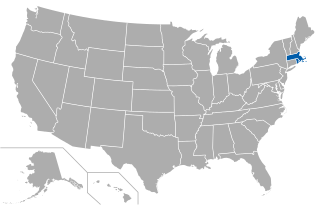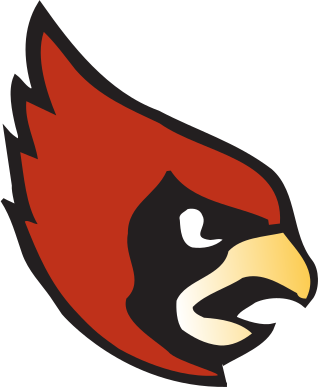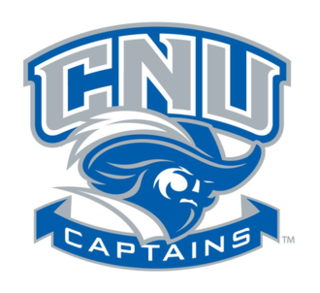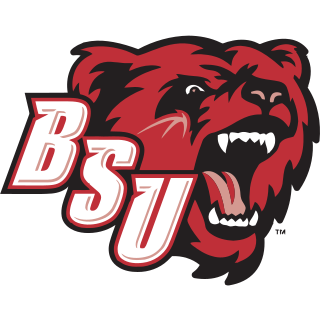Related Research Articles
The annual NCAA women's ice hockey tournament—officially known as the National Collegiate Women's Ice Hockey Championship—is a college ice hockey tournament held in the United States by the National Collegiate Athletic Association to determine the top women's team in the NCAA.

The ECAC Northeast was an intercollegiate athletic conference affiliated with the NCAA's Division III as a hockey-only conference. For many years it was one of the three men's hockey conferences that operated under the umbrella of the Eastern College Athletic Conference; the others were the ECAC East, and the ECAC West. Member institutions were located in the New England region of the United States, in the states of Massachusetts and Rhode Island.

The Delaware Fightin' Blue Hens are the athletic teams of the University of Delaware (UD) of Newark, Delaware, in the United States. The Blue Hens compete in the Football Championship Subdivision (FCS) of Division I of the National Collegiate Athletic Association (NCAA) as members of the Coastal Athletic Association and its technically separate football league, CAA Football.

The Bemidji State Beavers men's ice hockey team is a National Collegiate Athletic Association (NCAA) Division I college ice hockey program that represents Bemidji State University. The Beavers are a member of the Central Collegiate Hockey Association and play at Sanford Center in Bemidji, Minnesota, as of the 2010 season, after previously playing at the John S. Glas Field House.

The Bowdoin Polar Bears are the intercollegiate athletic teams that represent Bowdoin College, located in Brunswick, Maine. The Polar Bears compete in the National Collegiate Athletic Association (NCAA) and New England Small College Athletic Conference (NESCAC). Bowdoin College currently fields teams in fourteen men's sports and sixteen women's sports. The polar bear team name was selected to honor Robert Peary of the class of 1877 who lead the first expedition that reached the North Pole.

Catholic University of America's intercollegiate sports teams are called the Cardinals after the northern cardinal, and they compete in the NCAA's Division III. They are members of the Landmark Conference, the New England Women's and Men's Athletic Conference (football) and the Mid-Atlantic Rowing Conference (rowing). The team colors are red and black.

The Christopher Newport Captains are the athletic teams that represent Christopher Newport University, located in Newport News, Virginia, in NCAA Division III intercollegiate sports. The Captains compete as members of the Coast to Coast Athletic Conference (C2C) for the majority of varsity sports except for football, which plays in the New Jersey Athletic Conference and men's lacrosse, which plays in the Coastal Lacrosse Conference. The football team remains a NJAC associate member because C2C does not sponsor football.

The TCNJ Lions are the athletic teams representing The College of New Jersey (TCNJ). They are a member of the New Jersey Athletic Conference (NJAC) and compete within Division III of the National Collegiate Athletic Association (NCAA).

The Lake Superior State Lakers are the athletic teams that represent the Lake Superior State University, located in Sault Ste. Marie, Michigan, in NCAA Division II intercollegiate sporting competitions. The Lakers compete as members of the Great Lakes Intercollegiate Athletic Conference for 12 of 13 varsity sports, with the men's hockey team playing in the Central Collegiate Hockey Association. The Lakers have been members of the GLIAC since 1972.

The Bridgewater State Bears are composed of 22 varsity teams representing Bridgewater State University in intercollegiate athletics. All teams compete at the NCAA Division III level and all teams compete in the Massachusetts State Collegiate Athletic Conference (MASCAC), except for field hockey, tennis and swimming & diving which plays in the Little East Conference (LEC).

The Framingham State Rams are composed of 14 varsity teams representing Framingham State University in intercollegiate athletics. All teams compete at the NCAA Division III level and all teams compete in the Massachusetts State Collegiate Athletic Conference (MASCAC).

The 1999–2000 NCAA Division I men's ice hockey season began on October 1, 1999, and concluded with the 2000 NCAA Division I Men's Ice Hockey Tournament's championship game on April 8, 2000, at the Providence Civic Center in Providence, Rhode Island. This was the 53rd season in which an NCAA ice hockey championship was held and is the 106th year overall where an NCAA school fielded a team.

The NCAA Division II field hockey tournament is an annual single-elimination tournament conducted by the National Collegiate Athletic Association to determine the national champion of women's Division II collegiate field hockey in the United States. The tournament was held from 1981 and 1983, discontinued from 1984 and 1991, was re-instated in 1992, and has been held every year since.

The NCAA Division III field hockey tournament is an annual single-elimination tournament conducted by the National Collegiate Athletic Association to determine the national champion of women's Division III collegiate field hockey in the United States. The tournament has been held every year since 1981.

The annual NCAA Division I Men's Ice Hockey Tournament is a college ice hockey tournament held in the United States by the National Collegiate Athletic Association (NCAA) to determine the top men's team in Division I. Like other Division I championships, it is the highest level of NCAA men's hockey competition. This tournament is somewhat unique among NCAA sports as many schools which otherwise compete in Division II or Division III compete in Division I for hockey.

The NCAA Division III men's ice hockey tournament is an annual tournament to determine the top men's ice hockey team in NCAA Division III. The Division III championship was contested from 1984 through 2019, but then suspended due to COVID-19. The tournament resumed in the spring of 2022. The most successful team has been the Middlebury Panthers with eight titles.
The 1994 NCAA Division I field hockey tournament was the 14th annual single-elimination tournament hosted by the National Collegiate Athletic Association to determine the national champion of women's collegiate field hockey among its Division I members in the United States, the culmination of the 1994 NCAA Division I field hockey season.
The 1981 NCAA Division II Field Hockey Championship was the first annual NCAA-sponsored tournament to determine the top Division II women's college field hockey team in the United States.
ECAC 2 was an intercollegiate athletic conference affiliated with the NCAA's College Division. The league was created as a way to fairly divide the upper- and lower-class programs that had been members of ECAC Hockey. In 1984 the conference was split in two, creating ECAC East and ECAC West as completely independent leagues.
References
- ↑ "NCAA Division III Field Hockey Championship History" (PDF). Ncaa.com. Retrieved November 14, 2017.